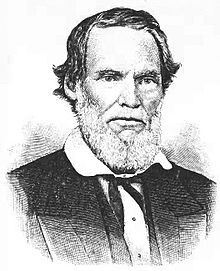Robert Emmett Bledsoe Baylor
| Robert Emmett Bledsoe Baylor | |
|---|---|
 |
|
| Member of the U.S. House of Representatives from Alabama's 2nd district |
|
|
In office March 4, 1829 – March 3, 1831 |
|
| Preceded by | John McKee |
| Succeeded by | Samuel W. Mardis |
| Member of the Alabama House of Representatives | |
|
In office 1824 |
|
| Personal details | |
| Born |
Robert Emmett Bledsoe Baylor May 10, 1793 Lincoln County, Kentucky |
| Died | January 6, 1874 (aged 80) Gay Hill, Texas |
| Political party | Jacksonian |
Robert Emmett Bledsoe Baylor (May 10, 1793 – January 6, 1874) was an ordained Baptist minister, district judge, politician and co-founder of Baylor University.
Baylor was born on May 10, 1793, in Lincoln County, Kentucky, to Walker and Jane Bledsoe Baylor. He served in the Kentucky militia during the War of 1812. After the war, he studied law under his uncle Jesse Bledsoe and practiced law in Kentucky. He was briefly a member of the Kentucky House of Representatives from 1819 to 1820, before he resigned and moved to Alabama.
In Alabama, he practiced law and continued his political career. In 1824, he was elected to the Alabama House of Representatives. Baylor was elected as a Jacksonian to the Twenty-first Congress (March 4, 1829 – March 3, 1831) from Alabama's 2nd congressional district and was an unsuccessful candidate for election in 1830 to the Twenty-second Congress. In 1836, Baylor fought as a lieutenant colonel against the Creek tribe in the Creek War of 1836. In 1839, he converted to Christianity and was ordained a Baptist minister.
At the age of 46, Baylor moved to Texas, where he would live for the rest of his life. He quickly made a name for himself in Texas law as judge of the Third Judicial District of the Congress of the Republic of Texas, and was appointed to the Texas Supreme Court as an associate justice in 1841, a position he would hold until the annexation of Texas in 1845. After Texas attained statehood, Baylor was appointed by Governor J. P. Henderson as judge over the Third Judicial District of the new state, a position he would hold until 1863.
...
Wikipedia
